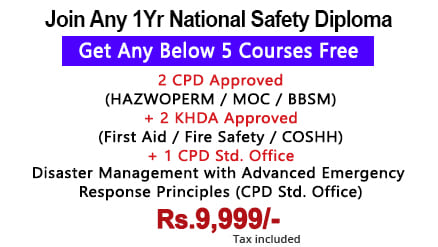
This qualification is aimed at learners who are working at a management level in a manufacturing business, quality assurance staff or members of a HACCP team. It would also be useful for trainers, auditors, enforcers and other food safety professionals. Achievement of this qualification gives learners the skills to assist in the implementation of a HACCP system, to critically evaluate HACCP plans and to understand the importance of having an effective HACCP system in place.
Subjects covered include the principles of HACCP management for food manufacturing, understanding the importance of HACCP-based food safety management procedures, understanding how to manage the implementation of HACCP-based food safety management procedures and understanding how to develop and evaluate HACCP-based food safety management procedures
- An Introduction to HACCP and Its Role in Food Safety Control
- Preparations and Planning to Achieve Effective Food Safety
- Hazards, Their Significance, and Control
- Prerequisites for Food Safety: PRPs and Operational PRPs
- Designing Food Safety
- How to Do a HACCP Study
- Implementation, Verification, and Maintenance for Ongoing Risk Management
- Considerations for HACCP Application in Different Supply Chain Sectors
- HACCP: Definitions and Principles
- Overview of Biological, Chemical, and Physical Hazards
- Hazard Analyses and Assignment of Risk Categories
- Determining Critical Control Points
- Establishing Critical Limits for Critical Control Points
- Monitoring Critical Control Point Critical Limits
- Corrective Action Procedures for Deviations from the
- Recordkeeping Systems for Documenting the HACCP Plan
- Verification of the HACCP Program
- Control Points and Critical Control Points
- HACCP Systems in Regulatory Inspection Programs: Case Studies
- Understand the importance of HACCP based food safety management procedures Legislation relating to HACCP
- The development requirements of the HACCP team
- The importance of effective communication
- Staff training needs
- The prerequisites for HACCP
- Food production processes including use of end product
- Process flow diagrams
- Hazards and risks in the production process
- Verification and review of procedures
- Documentation and record keeping procedures
THEORY PAPER
- HACCP – A Practical Approach (100 Marks)
- HACCP – Principles and Applications (100 Marks)
- HACCP Legislation (100 Marks)
- Guidelines for HACCP, GMP and GHP for ASEAN Food SMEs (100 Marks)
PRACTICAL
Case Studies on HACCP Systems in Regulatory Inspection Programs.(100 Marks)
HACCP: A Practical Approach take into account current best practice and new developments in HACCP application .This qualification is intended to be a compendium of up-to date thinking and best practice approaches to the development, implementation, and maintenance of HACCP programs for food safety management. The HACCP plan development and verification and maintenance chapters have also been substantially covered to reflect current practice. Appendices provide a new set of case studies of practical HACCP application plus two completely new case studies looking at lessons learned through food safety incident investigation. Pathogen profiles have also been updated by experts to provide an up-to-date summary of pathogen growth and survival characteristics that will be useful to HACCP teams.
HACCP principles and definitions, and an overview of biological, chemical, and physical hazards in foods. This qualification gives an in-depth discussion and analysis of each of the HACCP principles. HACCP as presented by the NACMCF relates to food safety concerns only; however, some government agencies and companies use control points other than those relating to safety within the context of HACCP. Therefore, a chapter is included on safety, quality and regulatory control points. Next, an action plan for implementing HACCP is given as well as an overview of the adoption of HACCP by federal regulatory agencies. Several specific examples for the application of HACCP principles are provided in the last chapter.
- Candidates/ Delegates who successfully complete and obtain the National safety diploma Course (approved by the Govt. of India) could further apply for a membership status with IIRSM. Awarding of the membership is at the discretion of IIRSM provided they have met the required guidelines for the same.
- Successful candidate will get Certificate & Mark list issued from Central Board of Examination & National Development agency, Promoted by Govt. of India
- Recognized in most countries
- Certification considered one year count increment in your educational qualification
Consular Services : i.e. Indian consulate
Ministry of External Affairs : India & any other ministry of foreign affairs that includes middle east region.













